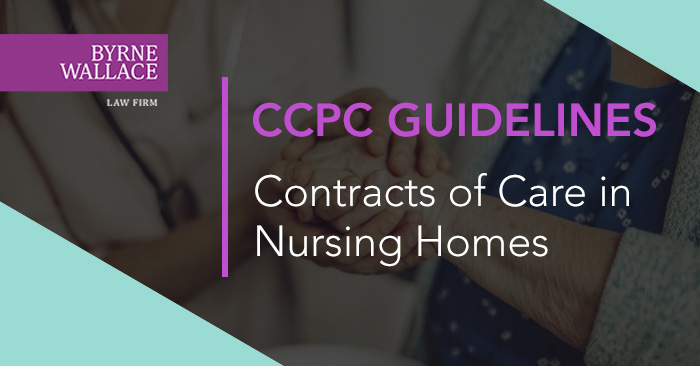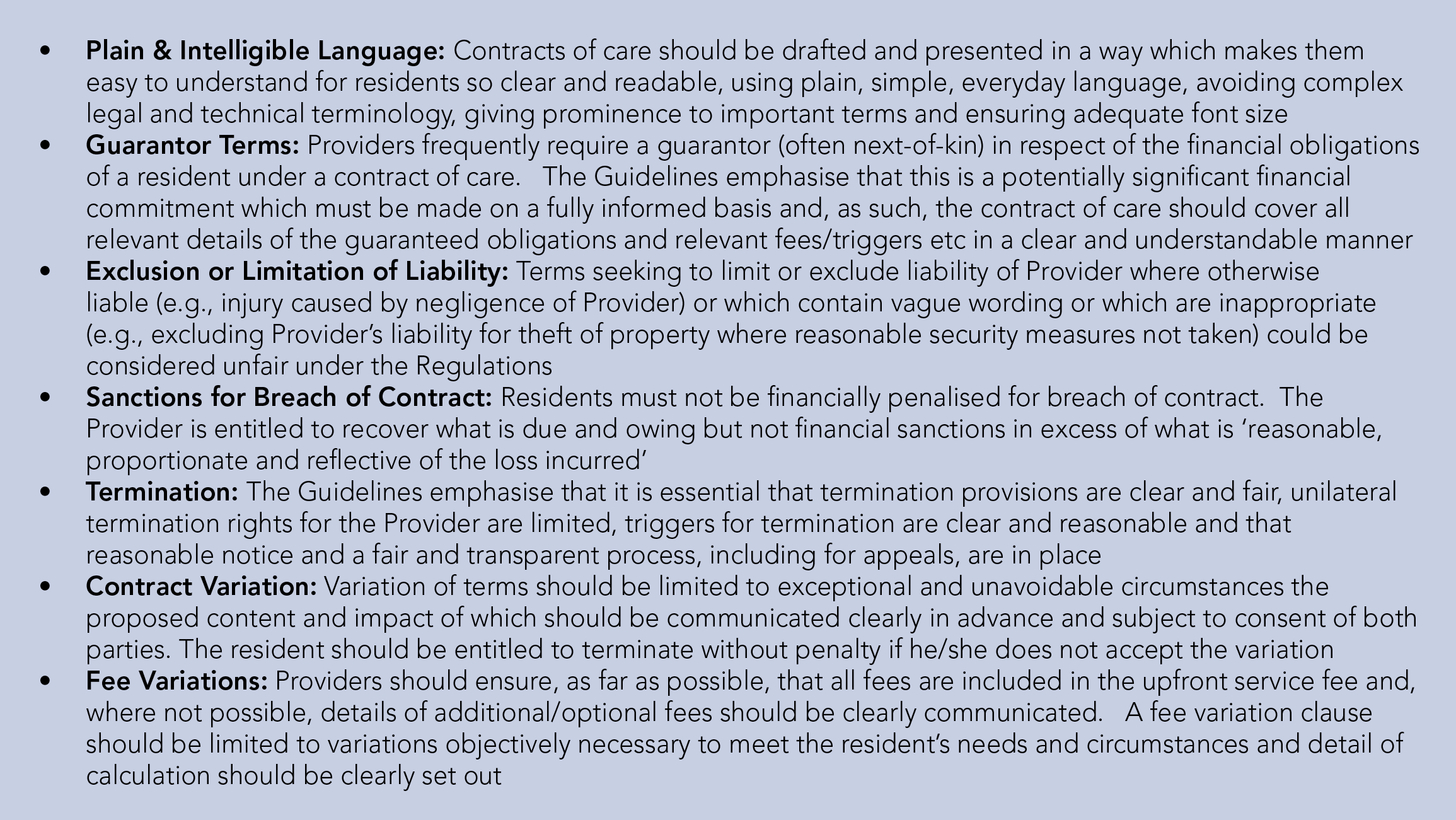Avoiding Unfair Terms in Nursing Home Contracts of Care – CCPC Guidelines
Tuesday, 18 June 2019
Ireland’s consumer law regulator, the Competition and Consumer Protection Commission (CCPC), recently published guidelines for contracts of care in nursing homes (the Guidelines). The Guidelines aim to protect nursing home residents (as consumers) from unfair terms in their contracts of care with nursing homes by assisting nursing homes (as service providers) in complying with their legal obligations under the EC (Unfair Terms in Consumer Contracts) Regulations 1995 (the Regulations). The CCPC achieves this by setting out the obligations and responsibilities to which nursing home registered providers (Providers) are subject under consumer protection law, by identifying certain types of terms which the CCPC considers to be unfair and by providing guidance on drafting fair terms. With publication of the Guidelines, the CCPC aimed to increase transparency, clarity and certainty for Providers and consumers.
What is a Contract of Care?
A contract of care is a written agreement entered into by a nursing home resident (or representative) and a Provider, upon admission of that resident to a nursing home. It sets out the terms and conditions and rights and responsibilities of each party and is a legal requirement under the Health Act 2007 (Care and Welfare of Residents in Designated Centres for Older Persons) Regulations 2013 (HIQA Regulations) and enshrined in HIQA’s National Standards for Residential Care Settings for Older People in Ireland, 2016 (National Standards). Providers are subject to a dual regime regarding contracts of care as CCPC is the competent authority to monitor compliance with Providers’ obligations under consumer protection law in respect of unfair contract terms while compliance with Providers’ legal obligations under the HIQA Regulations and National Standards is subject to HIQA oversight.
Why are the Guidelines necessary?
Contracts of care typically take the form of a standard form or template contract containing terms drafted in advance by the Provider in respect of which the resident has little or no opportunity to negotiate. As such, they are considered standard form consumer contracts falling within the ambit of the Regulations.
In developing the Guidelines, the CCPC undertook a review of standard form contracts of care currently in use in Ireland and found that; “The language used in contracts was often technical and may not be easily understood. In some cases, important information was not provided to the resident, which could prevent them from making an informed decision. The CCPC also found examples of potentially unfair terms, such as terms which allowed for significant changes to the contract with no prior consultation with the resident or their representative.”
The CCPC acknowledged that standard form contract terms addressed to vulnerable consumers, such as older consumers, should be subject to more stringent assessment in light of those consumers’ requirements and that fair terms ensure that residents understand their rights and obligations, avoid unnecessary disputes, improve relationships with residents and avoid reputational issues.
Legal Status of Guidelines and CCPC Enforcement Powers
The Guidelines have legal status in that they have been published by CCPC under its statutory powers to publish guidelines to assist traders in complying with consumer protection legislation under the Competition and Consumer Protection Act, 2014 (the CCPA14) and Consumer Protection Act 2007 (the CPA07). As such, they are admissible in evidence and may be taken into account in court proceedings.
Under the Regulations, the CCPC is entitled to apply to court for a declaration that a particular contractual term is unfair or for an injunction against any trader using or recommending use of an unfair contractual term. In addition, the CCPC can, in certain circumstances, accept an undertaking from a non-compliant trader to comply with the requirements of the Regulations.
CCPC Guidance on Fair Terms in Contracts of Care
The points highlighted by CCPC include the following:

Next Steps for Providers
The CCPC intends to assess compliance by Providers following a transition period. As such and given the legal status of the Guidelines, Providers should now arrange for a legal review of their standard form contracts of care to identify any potential non-compliance with the Regulations and consumer protection law and to make any necessary amendments both to the contract of care and to their contracting process.
The dedicated cross-departmental ByrneWallace Nursing Home/Residential Care Sector Team has extensive experience in advising providers of residential care services on sectoral-specific issues, including contracts of care. We would be happy to advise Providers on compliance of their contracts of care and contracting processes with the Guidelines and Regulations and also, if required, on compliance with the the HIQA Regulations and National Standards.
Further information
For further information and advice for Providers, please contact Gillian O’Shaughnessy, any member of the ByrneWallace Nursing Home/Residential Care Sector Team or your usual ByrneWallace contact.
The above information is intended as a guide for reference purposes only and does not purport to be legal advice. Readers are advised to seek independent professional advice before acting on anything contained in these materials.

